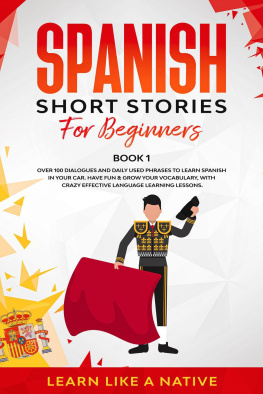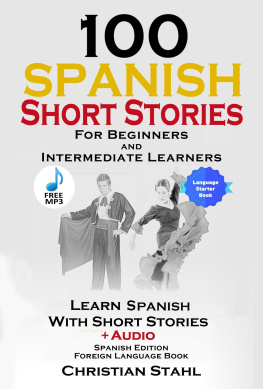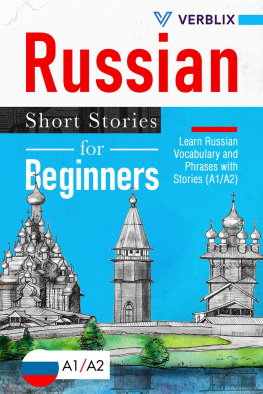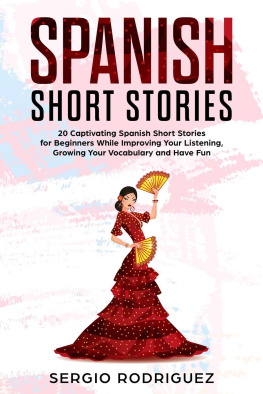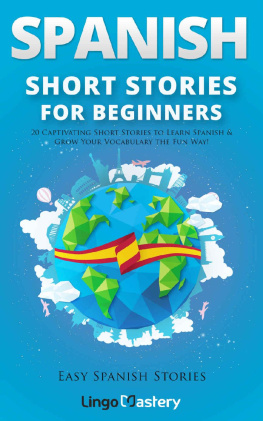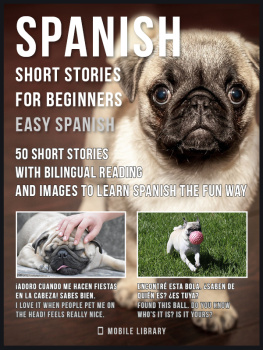Spanish Short Stories
20 exciting short novels for beginners and intermediate Spanish language learners
Fernando Salcedo
Contents
Copyright 2022 - All rights reserved.
The contents of this book may not be reproduced, duplicated or transmitted without direct written permission from the author.
Under no circumstances will any legal responsibility or blame be held against the publisher for any reparation, damages, or monetary loss due to the information herein, either directly or indirectly.
Legal Notice:
This book is copyright protected. This is only for personal use. You cannot amend, distribute, sell, use, quote or paraphrase any part or the content within this book without the consent of the author.
Disclaimer Notice:
Please note the information contained within this document is for educational and entertainment purposes only. Every attempt has been made to provide accurate, up to date and reliable complete information. No warranties of any kind are expressed or implied. Readers acknowledge that the author is not engaging in the rendering of legal, financial, medical or professional advice. The content of this book has been derived from various sources. Please consult a licensed professional before attempting any techniques outlined in this book.
By reading this document, the reader agrees that under no circumstances is the author responsible for any losses, direct or indirect, which are incurred as a result of the use of information contained within this document, including, but not limited to, errors, omissions, or inaccuracies.
Introduction
Learning a language takes a lot more than getting through a textbook or completing a course on a language app or website; you need to be able to understand and have day to day conversation in the language youre trying to learn. Textbooks and instructional courses are good for reaching that stage where you need to understand the formal aspects of the language - grammar, sentence structure, syntax, etc. -, but lacking the verbal variety and capacity to express yourself freely and accurately will severely affect your retention and use of the language youre trying to learn.
One of the most proven and effective methods to familiarizing oneself with a language and expanding vocabulary is exposing yourself to media and literature in that language. Not only will this help you grasp how the language is colloquialized and used in everyday life, it will also help you notice social and cultural aspects attached to the communities communicating with the language youre learning; we usually miss such nuances and idiomatic expressions when depending on subtitles for example.
Reading can be the most suitable exercise for you if you like to take your time dissecting what youre trying to understand. A lot of people prefer reading texts to listening if theyre still in the early stages of familiarizing themselves with an unfamiliar language since it gives one the space to look up words and reread without getting distracted by other aspects of what theyre consuming. Music and films can also work wonders, but at a later stage, where the learner has become fluent enough to understand the language in its most organic speed and form. That stage, however, can only be confidently reached when youve taken your time going through a number of texts; reading and exposing yourself to different words and sentences.
When it comes to choosing the type of text or literature youre going to be close-reading, you need to keep in mind that your top priority is expanding your vocabulary and knowledge of different sentence structures and intonations of speech. This is where short stories prove mightier than novels or larger texts; short stories can offer you a colorful variety of scenarios, tones, registers, and characters that will surely pull you into a whole new world of adjectives and nouns. Larger texts or novels are engaging and informative in their own way, but if youre looking to buff up your fluency and pick up on different ways to express yourself, you need the variety of writing styles found in short story collections.
This book is primarily intended for advanced beginners and intermediate Spanish speakers. Through this wide variety of short stories and genres, you'll widen your comprehension of the language, get more comfortable with prevalent sentence structures, phrases, and conversational rhythms, and gain a wealth of new vocabulary along the way! Each story in this book comes with:
- A brief summary in Spanish to help you contextualize what youre about to jump into.
- Accessible questions to test your comprehension of the different plots.
- A clear glossary of note-worthy and commonly used vocabulary found in the story, with their English translations.
Youre bound to run into sentences and words that seem quite unfamiliar to you, but do not let that demotivate you; this only proves how much you can learn from exposing yourself to a wide variety of texts and media. In such scenarios, the context of what youre reading - supporting sentences, words, or even the general atmosphere of an event or tone of writing can help you decipher that specific sentence or phrase youre struggling with; after all, this relational method of comprehension is one of the best ways to properly understand any language.
S ummary:
Vernica is a translator who, after several attempts, finally gets pregnant. Although she was able to fulfill her dream as a mother, she finds herself in a difficult scenario: a complicated marriage and a work situation that does not make her happy either. Over time, she will realize that she only has herself and her son, Ramiro..
Vernica, la mayor de dos hermanas, creci en un entorno humilde y precario, aunque siempre rodeada de amor y proteccin por parte de sus padres.
Por suerte, con el paso del tiempo, mejor su calidad de vida. Tanto ella como su familia pudieron mudarse a una mejor zona y en una casa ms grande y cmoda, no hubo que preocuparse por la comida porque siempre abund y, adems, tuvo la oportunidad de estudiar en colegios muy buenos.
No se poda quejar, por muchos aos, siempre tuvo buenos amigos, fue a fiestas y la pasaba genial, incluso cuando comenz su carrera como traductora e intrprete. Sin duda, la universidad fue una poca increble.
Como era natural para el momento en el que viva, se cas poco despus de graduarse y encontr un trabajo en una empresa de cosmticas como traductora de documentos oficiales.
Todo iba bien, hasta que lleg el momento de tener un hijo. A diferencia de todos lo dems, embarazarse fue un reto fsico y mental. Su esposo tena un problema hormonal que impeda que ella pudiera quedar encinta.
Vernica pas das con tratamientos fuertes y noches con malestares que la dejaban debilitada. Incluso, en ciertas ocasiones pens dejar todo eso y dedicarse mejor a su vida como profesional. Pero luego recordaba que tener un hijo era un sueo que quera hacer realidad, as que sigui hacia adelante.
Tras varios intentos y prdidas, Vernica por fin pudo quedar embarazada. El da que se enter, llor de emocin. No poda creer que tendra un beb.
La noticia, sin embargo, no fue bien recibida por sus compaeros de trabajo y menos de su jefe, un tipo de carcter insensible.
-Pap, romp fuente -Dijo Vernica su padre cuando le hizo una llamada para preguntarle algo sobre plomera.
-Vale, djame salir para irte a buscar.
El esposo de Vernica no atendi las llamadas ni los mensajes. Vernica no saba en dnde estaba, pero su beb no poda esperar. Nada poda esperar.
Con una panza de nueve meses, lleg sola al hospital. Justo all, su padre la ayud a subir las escaleras, mientras su madre sostena una mochila con ropa y otras cosas que pudiera necesitar durante su


